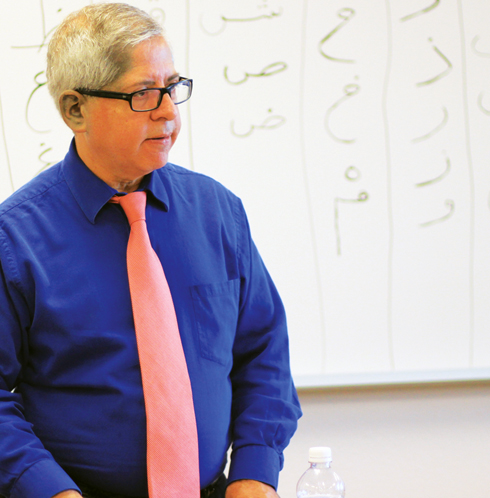Former broadcaster enlightens students


Yasmin Shirali/Pioneer
Professor Thabet Swaiss teaching his Arabic class. The class is taught every Wednesday from 5:30 pm to 8:00 pm.
Having covered many stories with an element of risk in Jordan before, today’s journalism students learned from one of the practitioners of Mid-East broadcast journalism.
A classroom of News Writing students listened to former Jordan Television Corporation reporter and current adjunct professor of Arabic, Thabet Swaiss, on Oct. 7.
For an hour, Swaiss relayed his experience the journalism field. He graduated from the University of Oklahoma in 1981 with a bachelor’s degree in journalism.
After graduation, Swaiss landed a job with the Jordan Television Company in Amman, Jordan, where he worked as an editor, reporter and writer.
Swaiss said he managed to get ahead due to an unrelenting work ethic. “I did not complain about the time and effort,” he said.
Swaiss spoke of many of the stories he covered in Jordan, his home country. Most of the media outlets in Jordan and the Middle East, such as Al-Jezeera, are semi-state funded media companies that limit what journalists are able to cover. Swaiss spoke of his meeting with King Hussein bin Tal.
In Jordan, “you never talk bad about the King,” he said.
The words Swaiss spoke of Hussein could almost be used to describe Swaiss himself. “He was a gentle man, soft spoken and very polite. He spoke English and was Western educated,” Swaiss recounted.
He continued to candidly speak about the regrets and thrills of his career. The biggest thrill, he said, was covering Fairouz, one of the biggest Lebanese pop stars in the region at the time.
Swaiss’s eyes lit up as he recalled speaking with her manager and being able to get access to the singer when no one else could. Swaiss said it was one of the true highlights of his career.
He spoke of the one regret of his career was declining to meet Shimon Peres, the head of the state of Israel.
Swaiss said he had the chance to encounter him at a 1984 Christmas party in Bethleham. However he said, he thought if he attended it would greatly upset his bosses due to the political ramifications of possibly being seen with Peres.
“It is always a great honor to meet heads of state.” Swaiss said.
After four years of working and living in Jordan, Swaiss packed up and moved to New York City. He said he enjoyed living in New York because he was a single, career-oriented guy with all the resources and benefits available to him living in the city.
While living in New York City, the 9/11 attacks occurred.
During the traumatic events, Swaiss said, he was holed up in his office for a day at a bank in midtown Manhattan, as he could not go home to his wife and newborn baby in Brooklyn Heights.
When he returned to work, Swaiss’ boss said to him: “If anyone messes with you, let me know.”
When someone from his office began harassing Swaiss for being of Middle Eastern descent, his boss simply told the employee he could not do that and moved their offices to separate them.
Swaiss went on to talk about what separates this generation of reporters from his generation. “Technology is dangerous and wonderful,” he said. “You get everything instantly. Within one or two minutes you know what is going on. I wish we had that in my day.”
Broadcasting major Casey Akard came away impressed with Swaiss. “With all of his experience in reporting, we were very fortunate to hear him speak in our class.”
Currently Swaiss seems content with teaching Arabic at OCCC and raising his family in Oklahoma. There is no danger in reporting that story, he said.